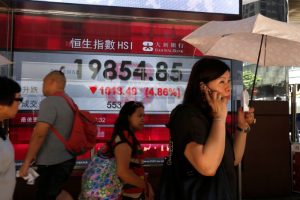Equity markets fell in Asia and Europe on Friday, with fears over the fast-spreading Delta variant, the Federal Reserve’s taper plans and China’s ongoing regulatory crackdown taking the wind out of the sails of the global recovery rally.
Asian shares finished the week heading for their lowest close since November and worst week since February, dragged down by losses in China and extending the sharp falls a day earlier.
The MSCI’s broadest index of Asia-Pacific shares outside Japan dropped 1.04%, down 4.8% on the week.
The Hong Kong benchmark touched its lowest this year, down 1.74%, with Beijing’s drive to tighten its grip on the Chinese economy continuing to batter confidence and delivering a blow to market heavyweights such as Alibaba, whose shares were down by another 2.28% after a 5% plunge on Thursday.
The healthcare index dropped by nearly 7% amid concerns that the sector will also face in regulatory scrutiny, along with liquor stocks, such as Kweichow Moutai, which was down over 4%.
On Friday, Beijing passed a sweeping privacy law to prevent state and private firms from collecting sensitive information on people. The move comes after leaders clamped down on a range of industries – particularly tech giants – citing personal data issues as well as security and antitrust breaches.
Markets in Shanghai, Tokyo, Sydney, Seoul, Taipei, Manila, Wellington and Mumbai also fell, though there were gains in Singapore, Bangkok and Jakarta.
Massive central bank support
Investors have for more than a year sent valuations surging on the back of colossal government and central bank support as well as optimism that the rollout of vaccines will help fight back against the coronavirus and allow economies to reopen.
But while inoculations continue to be administered and life is slowly returning to a semblance of normal, the virus mutation has forced experts to rethink their outlooks for growth as some countries reimpose containment measures and infection rates rise.
The prospect that the world may not emerge entirely from the crisis as early as hoped has knocked confidence in recent weeks, though the general view is that the end is still in sight.
Compounding the downbeat mood were minutes from the Fed’s July meeting that indicated it is likely to start winding down its ultra-loose monetary policy – the juice that has fuelled a long-running rally – by the end of the year.
A speech by Fed boss Jerome Powell at next week’s gathering of central bankers and finance chiefs at Jackson Hole, Wyoming, will be keenly watched for a taper timetable.
Still, analysts said the issue was just part of a range of issues absorbing investors now.
“Perhaps the best one can say is that the minutes were the straw that broke the camel’s back,” National Australia Bank’s Rodrigo Catril said. “We would attribute heightening concerns over the global growth outlook as the main cause for the turn in sentiment.
“Recent softer-than-expected Chinese economic data along with lockdowns/activity restrictions around the globe due to a rise in Delta infections have been simmering for sometime now (and) China’s regulatory/credit tightening drive has not helped either.”
‘Modest pullback’
OANDA’s Edward Moya added: “Regardless of Fed tapering timing, growth is only getting pushed further out, but given the excessive froth in the market a pullback seems warranted.
“Even if the Fed signals next week that a formal taper announcement will be done in September, the economy will still be supported by low interest rates, at least eight months of a gradual tapering, and more fiscal support from the Biden administration.”
Referring to the Fed’s decision to wind back similar support eight years ago, he said: “Investors should not expect a similar 2013 taper tantrum, but a modest stock market pullback that will likely be bought into.”
London fell in early trade as data showed a drop in retail sales, while there were also losses in Paris and Frankfurt.
Investors were unable to track small gains on the S&P and Nasdaq that were helped by data showing US jobless claims fell more than expected last week.
“The Delta variant of Covid is significantly more serious than anyone is really even pricing into the market,” Hilary Kramer, of Kramer Capital Research, said. “We know that tapering is coming. We know that the market is getting tired.”
The dollar held on to recent gains against its major peers and other units, boosted by the prospect of better returns in the United States as the end of the Fed’s loose monetary policies sees rates edge up.
Key figures around 0810 GMT
Tokyo – Nikkei 225: DOWN 1.0% at 27,013.25 (close)
Hong Kong – Hang Seng Index: DOWN 1.8% at 24,849.72 (close)
Shanghai – Composite: DOWN 1.1% at 3,427.33 (close)
London – FTSE 100: UP 0.2% at 7,071.59
West Texas Intermediate: DOWN 0.1% at $63.60 per barrel
• AFP and Jim Pollard
























